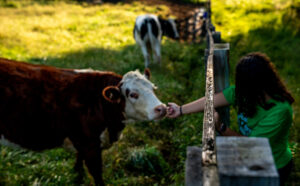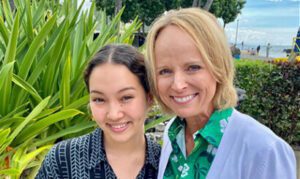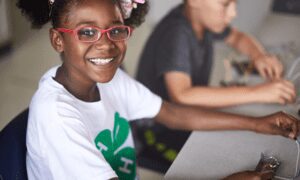Teens Empower Community through Digital Skills Education Program
CHEVY CHASE, MD (December 14, 2021) – Today, National 4-H Council announced the national 4-H Tech Changemakers for 2022. Five 4-H teens from around the country were selected as ambassadors of the 4-H Tech Changemakers program. They will spend the next year teaching digital skills in their local communities while advocating for digital equity and skills education across the country.
The 4-H Tech Changemakers program trains and equips teens to teach adults digital employability skills that include online job seeking, social media marketing, software use, and more. The $8.5M investment from coalition partners—Verizon, Microsoft, Tractor Supply Company, and Land O’Lakes—will allow 4-H teens to bring vital digital skills to 164 communities, with a focus on rural communities and communities of color.
Jenna joined the program after observing how a lack of digital resources at her county 4-H office hindered the ability to plan 4-H activities throughout the year. As a new Tech Changemaker, she has already started teaching digital literacy classes and advocated for digital equity by speaking to local county officials about differing access from county to county.
“Growing up on a farm in a small, rural town has opened my eyes to how challenging not having access to technology can be. Every day, I’ve witnessed the struggles of not having computers, cell phones, or WiFi in a digitally connected world,” Jenna says.
Stephen joined the program to address a growing need for local business owners to learn digital skills. As a Gen Z digital native, Stephen has an intuitive knowledge to help adults across industries and professions become more comfortable applying technology to their businesses.
“I believe teens should be leading the charge in bridging the digital divide because young people can be seen as more approachable, It also gives people a sense of security because people already believe teens know all these things,” says Stephen.
Having lived in New York City and rural Kentucky, Abigail has experienced firsthand how the digital divide is an issue that crosses state lines. She has witnessed family and friends struggle with technology and the dangers of cyber-bullying. Through Tech Changemakers, she hopes that digital footprint and online safety classes will create a safe place for youth and adults to collaborate digitally. and the
“It is very important that my community has access to high-speed internet and learning digital skills because of how our world today is structured. People in my community that are low-income are especially affected by this since many don’t know how to be safe from viruses or how to download something on a computer Having digital skills can help with their current jobs and may also help them get higher-paying jobs.”
Rob knows firsthand how the importance of broadband access and digital skills education can impact career goals. The lack of broadband internet for over 30% of households in his county has adversely impacted economic opportunity in the area. Rob’s access to STEM and computer coding programs has influenced his desire to seek a mechanical engineering degree after high school. In the meantime, he continues to pay it forward by providing digital skills education for people in Arkansas County.
“Digital skills are essential to everyone. You can attend college, pay bills, and even work through the Internet. Without these skills it puts you at a disadvantage in life. Access to broadband gives school kids access to online learning and adults access to online education, jobs, and bill paying,” Rob says.
Caroline joined the program to change the face of digital literacy in her local community of David City. In a town of 3,000 where broadband internet is not guaranteed, the digital skills and internet safety education gap is felt by many. She strives to reach over 100 adults with digital trainings that teach life-changing skills and promote economic growth.
“I was inspired to get involved in the 4-H Tech Changemakers program by my community and my family. I love helping others in my community and one of my passions is technology, so having the opportunity to do two things I love at once was something I couldn’t pass up,” says Caroline.
Through 4-H Tech Changemakers, hundreds of teens are teaching digital literacy classes designed to help everyone from small business owners to farmers. With the support of 4-H’s Cooperative Extension network, 20 Land-Grant Universities (LGUs)–11 of which are Historically Black Colleges and Universities (HBCUs)–will prepare 4-H teen leaders to teach critical digital skills to adults in their community. This year, Tech Changemakers will reach an estimated 50,000 adults across 18 states.
4-H Tech Changemakers empowers young people to close the country’s widening digital divide by providing them with the education and tools they need to teach digital employability skills, such as online job seeking, social media marketing and software use to adults in their communities. The program recently expanded its commitment to service more than 50,000 adults across 164 communities nationwide.
















